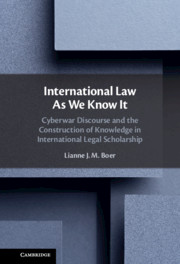 International Law As We Know It
International Law As We Know It Book contents
- International Law As We Know It
- International Law As We Know It
- Copyright page
- Contents
- Acknowledgments
- 1 Knowing International Law
- 2 “Legal Problem-Solution” and the Cyberwar Discourse
- 3 “Not ‘Armed Force’ in the Literal Sense”
- 4 “The Greater Part of Jurisconsults”
- 5 “Call Me Again If You’re Ever Ready to Begin Answering the Questions”
- 6 In Conclusion: International Law As We Know It
- Appendix Chapter 5
- Bibliography
- Index
5 - “Call Me Again If You’re Ever Ready to Begin Answering the Questions”
Published online by Cambridge University Press: 01 October 2021
- International Law As We Know It
- International Law As We Know It
- Copyright page
- Contents
- Acknowledgments
- 1 Knowing International Law
- 2 “Legal Problem-Solution” and the Cyberwar Discourse
- 3 “Not ‘Armed Force’ in the Literal Sense”
- 4 “The Greater Part of Jurisconsults”
- 5 “Call Me Again If You’re Ever Ready to Begin Answering the Questions”
- 6 In Conclusion: International Law As We Know It
- Appendix Chapter 5
- Bibliography
- Index
Summary
This chapter inquires into the way the most prominent figure in the cyberwar discourse, Michael Schmitt, constructs his authority in his presentations. It concludes that these presentations entail a kind of map-drawing: the first part of the chapter shows how Schmitt relates to ‘time’ by positioning himself as well as the Tallinn Manual within the past, present and future of international legal thinking. The second part of the chapter shows how he constructs a spatial map of the field within which he functions and discursively relates to several ‘others’: nonlawyers; other(s) (lawyers) who, in his view, misinterpret international law as well as those he refers to as “pure academics”; third, the group of experts involved in the composition of the Manual; and finally, himself in the third person. Following the construal of all these links, what is left at the heart of the discursive map is Schmitt himself, holding the key to legal knowledge as well as functioning as gatekeeper for those he considers suitable to partake in the cyberwar debate.
- Type
- Chapter
- Information
- International Law As We Know ItCyberwar Discourse and the Construction of Knowledge in International Legal Scholarship, pp. 127 - 169Publisher: Cambridge University PressPrint publication year: 2021
